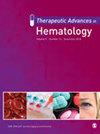Systematic literature review of the indirect costs and humanistic burden of β-thalassemia
IF 3.1
3区 医学
Q2 HEMATOLOGY
引用次数: 0
Abstract
Background:β-Thalassemia is an inherited blood disorder requiring lifetime management of anemia and its complications.Objective:This study aimed to determine the indirect costs and humanistic burden of β-thalassemia.Design:A systematic literature review was conducted.Data sources and methods:Searches were conducted in Embase, MEDLINE, MEDLINE In-Process, and EconLit (November 1, 2010, to November 25, 2020). Studies reporting indirect costs and health-related quality of life (HRQoL) for patients with β-thalassemia were eligible.Results:Seventy-five publications were included. Mean annual days lost due to transfusion-related absenteeism ranged from 15.6 to 35 days. Patients spent a mean of 592 min (standard deviation (SD): 349) daily on disease management on transfusion days and 91 min (SD: 221) daily on non-transfusion days. Patients with non-transfusion-dependent β-thalassemia (NTDT) showed worse HRQoL versus those with transfusion-dependent β-thalassemia (TDT) on the 36-item Short Form Health Survey (75.8 vs 66.5; p = 0.021). Caregivers of patients with TDT had more severe stress compared with patients (20.17 vs 18.95; p = 0.006), as measured by the standardized Cohen Perceived Stress Questionnaire.Conclusion:TDT is associated with substantial indirect costs and caregiver burden, and NTDT is associated with worse HRQoL. There is an unmet need for novel treatments in both TDT and NTDT that minimize patient and caregiver burden.关于β地中海贫血症间接成本和人文负担的系统文献综述
背景:β-地中海贫血是一种遗传性血液疾病,需要终生治疗贫血及其并发症。目的:本研究旨在确定β-地中海贫血的间接成本和人文负担。数据来源和方法:在Embase、MEDLINE、MEDLINE In-Process和EconLit中进行检索(2010年11月1日至2020年11月25日)。结果:共纳入 75 篇出版物。输血相关缺勤造成的年平均损失天数从 15.6 天到 35 天不等。输血日患者每天用于疾病管理的平均时间为 592 分钟(标准差:349 分钟),非输血日患者每天用于疾病管理的平均时间为 91 分钟(标准差:221 分钟)。在 36 项简表健康调查中,非输血依赖型β地中海贫血(NTDT)患者的 HRQoL 比输血依赖型β地中海贫血(TDT)患者差(75.8 比 66.5;P = 0.021)。TDT患者的照顾者与患者相比压力更大(20.17 vs 18.95;p = 0.006),以标准化的科恩压力问卷(Cohen Perceived Stress Questionnaire)来衡量。TDT和NTDT都需要新的治疗方法来减轻患者和护理人员的负担。
本文章由计算机程序翻译,如有差异,请以英文原文为准。
求助全文
约1分钟内获得全文
求助全文
来源期刊

Therapeutic Advances in Hematology
HEMATOLOGY-
CiteScore
4.30
自引率
0.00%
发文量
54
审稿时长
7 weeks
期刊介绍:
Therapeutic Advances in Hematology delivers the highest quality peer-reviewed articles, reviews, and scholarly comment on pioneering efforts and innovative studies across all areas of hematology. The journal has a strong clinical and pharmacological focus and is aimed at clinicians and researchers in hematology, providing a forum in print and online for publishing the highest quality articles in this area.
 求助内容:
求助内容: 应助结果提醒方式:
应助结果提醒方式:


